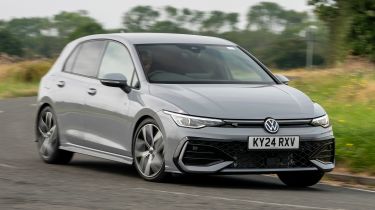Volkswagen Golf moves to Mexico, as German giant sheds 35,000 jobs
Huge restructuring also sees VW slash domestic capacity by 750,000 cars

VW’s iconic Golf hatchback is following in the wheeltracks of its Beetle ancestor to a second life in Mexico, as the company announces a huge restructuring that will cost 35,000 jobs in Germany by 2030.
The firm announced today that it has concluded a joint agreement with unions to make desperately needed changes to improve competitiveness in a rapidly changing global market. The package of measures will ultimately reduce VW’s domestic German capacity by three-quarters of a million vehicles, as the firm attempts to reposition itself as the self-proclaimed “technology leading manufacturer globally”.
VW says the package named 'Zukunft Volkswagen’ or ‘future Volkswagen’, will save an eye-watering 15 billion Euros annually in the mid-term, with the reduction in labour costs alone saving a whopping 1.5bn, while measures to consolidate production will save 4bn annually.
Those measures include the end of vehicle production at VW’s so-called ‘Transparent Factory’ in Dresden, a glass-fronted edifice which has previously accommodated production for the Volkswagen Phaeton and Bentley Flying Spur, and has more recently been the home of electric Golf models and the ID.3. As recently as 2021, VW was pledging to continue to develop Dresden into the "Home of ID in the coming years”, but the pace of the onslaught from cheap Chinese brands and slower than anticipated consumer take-up of pure-electric models has forced a radical rethink.
As part of this restructuring, the ID.3 and Cupra Born models will move to Wolfsburg, while the Golf hatch and estate make the journey overseas to VW’s Puebla, Mexico plant. Wolfsburg’s future will further be secured at the end of the decade with the introduction of the electric Golf and another model based on the future SSP electric car architecture, the company says.
In a statement issued on 23 December, VW said: “At company level, the company and employee representatives have agreed to realign the production capacities of the German Volkswagen plants with new structures and technologies to ensure competitiveness. To this end, production capacity in Germany will be reduced by approximately 734,000 units. The company is thereby responding to the decreasing automotive market in Europe and the increasingly fierce competition, while at the same time creating the fundamental requirements for continued commercially viable production at its home base in Germany.”
Thomas Schäfer, who is CEO of the Volkswagen Passenger Cars brand, says the agreement addresses three priorities the firm set out to ensure the future viability of VW: “Reduce overcapacity in Germany, reduce labour costs and achieve competitive development costs. With the agreed package of measures, we have thus created the basis for making Volkswagen the technologically leading volume manufacturer by 2030 - with a clear plan, strong products and a clear commitment to Germany as a business location.”
Want the latest car news in your inbox? Sign up to the free Auto Express email newsletter...








